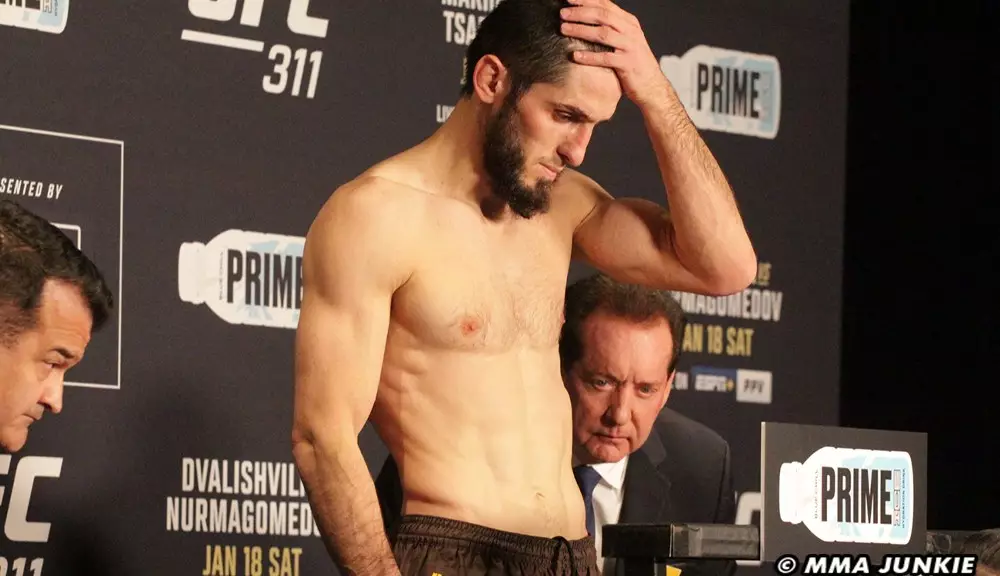In the dynamic and often tumultuous world of mixed martial arts (MMA), fighters frequently grapple with the pressures of competition, legacy, and the incessant need for recognition. Islam Makhachev, the reigning UFC lightweight champion, has recently ignited discussions regarding his potential move to middleweight. Analysts and fighters alike are weighing in on his motivations, with former fighter Chael Sonnen providing a particularly provocative perspective. His insights raise questions about the implications of such a move and the internal struggles facing elite athletes in combat sports.
Makhachev emerged victorious against Renato Moicano at UFC 311, and shortly thereafter, he mentioned the possibility of contending for the middleweight title against Dricus Du Plessis. Making such a significant leap from 155 pounds to 185 pounds is not merely a physical challenge; it also depicts a shift in strategy. Fighters like Makhachev must consider not just their current skill set but also the physical adjustments required to compete successfully against larger opponents. Sonnen’s assertion that Makhachev’s aspirations may not stem from a desire to build a legacy but rather an attempt to escape the rigors of his weight class is intriguing. Could it be that the pressures associated with cutting weight are compelling Makhachev to seek refuge in a higher division?
A noteworthy component of the debate is Makhachev’s connection to the welterweight champion, Belal Muhammad. Sonnen argues that Makhachev’s outspokenness regarding middleweight contenders is odd, suggesting that these calls serve more as a diversion from the fact that he cannot challenge a teammate. This notion of loyalty within teams in MMA draws parallels to other sports but emphasizes a unique camaraderie often seen among fighters in the same camps. Makhachev’s affiliations with notable figures such as Khabib Nurmagomedov further complicate his narrative. Sonnen seems to believe that these relationships shape Makhachev’s career choices, and that the barriers placed by loyalties to teammates could impede his growth and pursuit of higher accolades.
Sonnen’s insights extend into a broader critique of retirement motivations in the sport. The former fighter mentions Khabib Nurmagomedov and suggests that concerns over making weight played a pivotal role in Khabib’s decision to step away from competition. This hindsight into Khabib’s retirement raises an alarm for Makhachev, who might be grappling with similar issues related to weight management. Sonnen posits that the common thread among retiring fighters is often their exhaustion from dealing with the scale more than any external factors presented in their parting narratives.
If Makhachev is indeed feeling the weight—both literally and figuratively—then his decision to pursue opportunities outside of lightweight might be rooted not just in ambition but in a fundamental desire for relief. The physical and mental toll of constantly making weight while balancing the demands of elite competition can lead to burnout, suggesting that Makhachev’s potential move upwards could be a strategic recalibration.
While the prospect of Makhachev challenging at 185 pounds may be enticing, there lies an underlying complexity. The training, diet, and conditioning needed to adapt to a larger weight class could significantly alter Makhachev’s approach to fighting. There is always a substantial risk involved with competing against tougher, larger opponents who may exploit any weaknesses born from the transition. However, if executed wisely, seizing the middleweight category could pave new paths for Makhachev and potentially revive the fighting spirit stifled by the demands of lower weight cut regimes.
Ultimately, whether or not Makhachev should pursue this endeavor hinges on individual readiness and strategic foresight. The conversation surrounding his ambitions should not solely center around accolades and records but ought to scrutinize the deeper implications of weight management and internal pressures within a fighter’s career. As the landscape of MMA evolves, so must the narratives surrounding its athletes, particularly those like Makhachev, who stand on the brink of significant new achievements or untimely outcomes. This reflection serves as a reminder for both fans and fighters to recognize the nuanced realities of the sport, where personal desires often intersect with the demands of competition.

